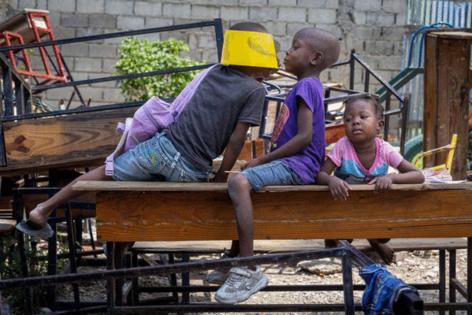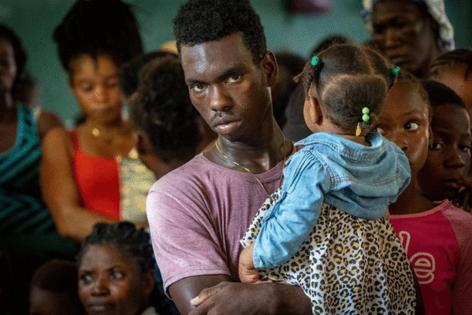Record hunger, displacements continue to hit Haiti as hospitals, businesses close
Published in News & Features
The French medical charity Médecins Sans Frontières is known for working in some of the world’s most difficult combat zones. But in violence-torn Haiti, the stray bullets have become so frequent that the charity, known as Doctors Without Borders in the U.S., announced this week that it’s been left with no choice but to permanently close the doors of its trauma hospital in central Port-au-Prince.
“For several weeks now, the area surrounding the center of Port-au-Prince has been the scene of regular armed violence,” Jean-Marc Biquet, one of the charity’s heads of mission, said. “If medical activities were to resume at this hospital, located in the immediate vicinity of these clashes, they would be severely compromised by the level of risk to patients and health care workers.”
In a city where most hospitals aren’t functioning — and those still operating are struggling to stay open amid violence, funding cuts, staff layoffs and Haitians’ inability to pay — the loss of the trauma center will have a profound impact. So far this year, 3,000 people have been killed in gang-related violence, and gunshot injuries and gang rapes are on the rise.
On Tuesday, the same day the medical charity announced the permanent closure of its hospital in Turgeau, a metalworks company that had been in operation for more than 75 years and employed 350 people was doing the same.
Haiti Metal S.A., located in Carrefour, a sprawling suburb at the southern end of metropolitan Port-au-Prince that’s completely under gang control, said it has no choice to but to shut down. The company has been the victim of rampant gang attacks, including the kidnappings of staff in 2022 and the Nov. 15, 2024, killing of its director of operations, Clairangélique Guirand Villard, who was gunned down by a gang in front of her 4-year-old daughter.
The company said in a press release that it was “again a victim of a lack of vision and understanding of people claiming to play the role of leaders of the country. A few weeks ago, the company’s production facilities were looted and completely stripped by gangs, and the last of its employees forced to flee. The factory is known for its manufacturing of everyday metal items that catered to the country’s lower classes, including houseware and beds.
On Wednesday, the United Nations International Organization for Migration said the number of Haitians forced to flee their homes because of the ongoing violence has hit a new record: more than 1.4 million.
A 36% increase since the end of last year, the number of Haitians displaced by violence is the highest ever, said the U.N., which warned in a separate report that Haiti continues to be stricken by record levels of hunger.
“The severity of this crisis demands increased and sustained response,” said Grégoire Goodstein, the U.N. migration office’s chief of mission in Haiti. “What is needed now are sustainable solutions that restore dignity, foster resilience, and create lasting alternatives for those enduring this long and complex crisis.”
Nearly two thirds of the new displacements have occurred outside Port-au-Prince, particularly in the Center and Artibonite regions, continuing a trend seen in previous assessments, the migration office said. In addition to being overcrowded, shelters for people who are homeless continue to experience shortages of basic services.
With no income or assets, the internally displaced are disproportionately affected by the crisis, the U.N. said.
Haiti remains among the world’s top hot spots for hunger, and is among six countries the World Food Program decided to focus on in a report, “A Lifeline At Risk.” The report looks at funding cuts and what it means for the countries already experiencing civil strife. Along with Haiti, the report features Afghanistan, the Democratic Republic of the Congo, Somalia, South Sudan and Sudan.
“We see significant reductions in our operations and the operations of our partners, and that goes from cutting people completely off of assistance, reducing rations, reducing the duration of assistance. And many vulnerable people are completely without a safety net,” said Ross Smith, WFP’s director of emergency preparedness and response.
Smith said while the U.N. is seeing “a minor success story” in a drop in the number of Haitians now facing famine-like conditions because of some targeted assistance in specific areas in the country, Haiti is still “facing record levels” of people struggling to find enough to eat.
“We’ve been forced to suspend our hot meals program for displaced people, and we’ve had monthly rations, because of funding issues,” Smith said.
This year alone, the World Food Program is facing a 40% reduction in funding as the U.S. and other countries cut assistance. The reductions mean that 13.7 million people worldwide will fall into emergency levels of hunger, Director of Food Security and Nutrition Analysis Jean Martin Bauer said.
“There’s no contingency stock in Haiti,” Bauer said. “And we’re still in the hurricane season that lasts until Nov. 30.”
Haiti’s deepening crisis come as the country awaits the arrival of a beefed up international mission. Last month, the U.N. Security Council approved a Gang Suppression Force for Haiti, but the arrival of the first deployments are still months away as the Trump administration tries to get countries to provide the funds.
The situation remains tense in Port-au-Prince. Over the weekend, members of the Viv Ansanm gang coalition launched another attack in Kenscoff in the hills above Port-au-Prince, and amid a firefight with Haitian police, set fire to the Wynn Farm, according to police. The property is a revered ecological preserve.
Also, after a lull, ransom kidnappings are making a resurgence. One viral video on Wednesday showed a resident who was traveling by car near the Airport Road in Port-au-Prince successfully averting an abduction in an exchange of gunfire with his attempted kidnappers, who appeared to be dressed as cops.
The day before, several people were injured outside a hospital in downtown Port-au-Prince after two armed drones, supposedly targeting a tractor, missed their target. The incident occurred near the downtown branch of GHESKIO, a local medical center that had already been forced to reduce staffing at the location after many of its doctors and healthcare providers were victims of kidnappings. No patients were killed, but individuals in front of the hospital were injured, along with several cars and motorcycles, an employee told the Miami Herald. In an audio shared with the Miami Herald, a hospital employee could be heard pleading for hospitals to remain protected.
To the north of Port-au-Prince, in the Lower Artibonite Valley, gang clashes near the Hôpital Albert Schweitzer prompted a call for police reinforcements.
Médecins Sans Frontières first suspended services at its Turgeau location in March after staffers were fired on during a battle between gang members and police. The charity also shut down operations at a trauma hospital just to its south in Carrefour.
Since then, several assessments have been conducted to identify suitable protection solutions at the Turgeau site, but no option has been able to guarantee a sufficient level of security to continue activities, the medical charity. Meanwhile, the building has already been hit several times by stray bullets due to its location near the combat zones, Biquet, the charity’s head of mission, said.
“MSF deeply regrets this difficult decision, which was taken as a last resort,” he said. “This closure has a significant impact on access to healthcare for a community already severely affected by violence, instability, and increasingly precarious living conditions.”
As for its other facilities, MSF said before resuming medical activities in Carrefour and downtown Port-au-Prince, it is awaiting the signing of a memorandum of understanding with Haitian authorities that would establish a safe pathway between both areas.
_____
©2025 Miami Herald. Visit miamiherald.com. Distributed by Tribune Content Agency, LLC.










Comments